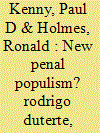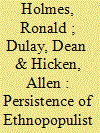|
|
|
Sort Order |
|
|
|
Items / Page
|
|
|
|
|
|
|
| Srl | Item |
| 1 |
ID:
174125


|
|
|
|
|
| Summary/Abstract |
Drawing on evidence from the Philippines, this paper investigates the so-called penal populism thesis. Penal populism refers to an understanding of justice in which criminal and anti-social activity should be harshly punished. The paper tests whether support for harsh penal policies, including the use of extrajudicial killings, is associated with underlying populist attitudes and preferences for charismatic leadership. Since coming to power in 2016, President Rodrigo Duterte has waged a violent and highly popular campaign against drug-related criminality. Based on survey modules fielded in 2016 and 2017, the paper demonstrates a positive relationship between populist attitudes and support for the campaign against illegal drugs in general and the extra-judicial killing of suspected drug users and dealers in particular. It also demonstrates a relationship between belief in the charisma of Duterte and support for the campaign against illegal drugs. The implications of the theory and results for the fields of populism and penal populism research are discussed.
|
|
|
|
|
|
|
|
|
|
|
|
|
|
|
|
| 2 |
ID:
189050


|
|
|
|
|
| Summary/Abstract |
The past few years have seen an emergence of populist leaders around the world, who have not only accrued but also maintained support despite rampant criticism, governance failures, and the ongoing COVID pandemic. The Philippines’ Rodrigo Duterte is the best illustration of this trend, with approval ratings rarely dipping below 80 percent. What explains his high levels of robust public support? We argue that Duterte is an ethnopopulist who uses ethnic appeals in combination with insider vs. outsider rhetoric to garner and maintain public support. Moreover, we argue that ethnic affiliation is a main driver of support for Duterte, and more important than alternative factors such as age, education, gender, or urban vs. rural divides. We provide evidence of Duterte's marriage of ethnic and populist appeals, then evaluate whether ethnicity predicts support for Duterte, using 15 rounds of nationally representative public opinion data. Identifying with a non-Tagalog ethnicity (like Duterte) leads to an 8 percent increase in approval for Duterte, significantly larger than any other explanatory factor. Among Duterte supporters, a non-Tagalog ethnicity is associated with 19 percent increase in strong versus mild support. Ethnicity is the only positive and significant result, suggesting that it strongly explains why Duterte's support remains robust. Alternative explanations, such as social desirability bias and alternative policy considerations, do not explain our results.
|
|
|
|
|
|
|
|
|
|
|
|
|
|
|
|
|
|
|
|
|